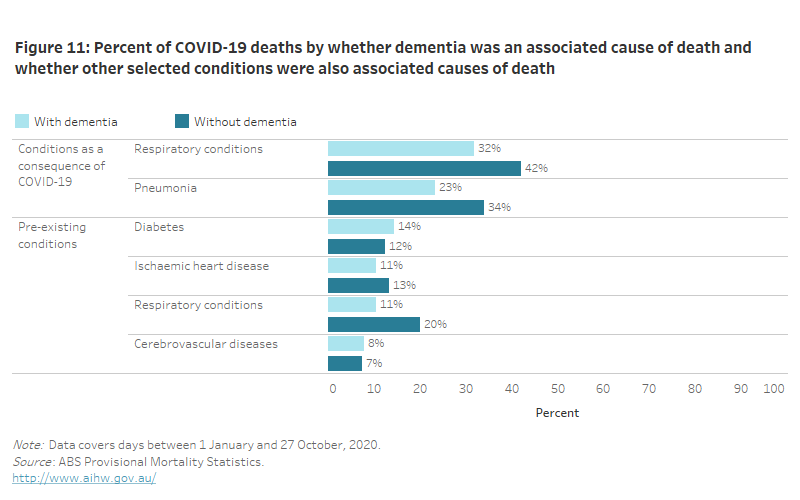What other health conditions were recorded among people who died due to COVID-19?
Among people who died due to COVID-19, those who also had dementia recorded on their death certificate had different patterns of health conditions recorded compared to those who did not have a record of dementia.
Figure 11 shows a selected number of health conditions that are common among people who die with dementia, as well as respiratory conditions, which COVID-19 may have caused or exacerbated. Note that respiratory conditions encompass acute conditions (like pneumonia and influenza) and chronic conditions (like asthma and emphysema).
During the first 10 months of 2020, people who died due to COVID-19 with dementia were:
- less likely than those without dementia to have had pre-existing respiratory conditions recorded on the death certificate
- less likely to have acute respiratory conditions recorded on the deaths certificate (including pneumonia), as a consequence of contracting COVID-19
- about as likely as those without dementia to have had pre-existing ischemic heart disease, diabetes, and cerebrovascular conditions recorded on the death certificate.
Figure 11: Percent of COVID-19 deaths by whether dementia was an associated cause of death and whether other selected conditions were also associated causes of death.
This figure shows the percentage of people who died due to COVID-19 who also had other specific health conditions, by whether or not they also died with dementia. During the first 10 months of 2020, people who died with dementia were less likely than those who died without dementia to have had pre-existing respiratory conditions and acute respiratory conditions (as a consequence of contracting COVID-19); both groups were as likely to have had pre-existing ischemic heart disease, diabetes, and cerebrovascular conditions.

We are unable to determine the reasons for the observed patterns in health conditions recorded among people who died due to COVID-19 with a record of dementia, but one or more of the following factors could be influential:
incomplete certification: 232 of the 858 people who died due to COVID-19 had no other pre-existing conditions recorded and 87 had no other conditions recorded as resulting from COVID-19 (such as pneumonia). While this may truly reflect their health profile, it may also reflect incomplete certification of COVID-19 deaths, particularly for deaths that occurred at the beginning of the pandemic (ABS 2020a). During this time, doctors may have had to certify COVID-19 deaths quickly and only added conditions where medical histories were readily available
differences in COVID-19 progression among people with dementia: older people with COVID-19 are more likely to develop delirium (characterised by disturbances of consciousness, attention, perception, thought, memory, psychomotor behaviour emotions, sleep-awake cycles, and hallucinations), and are less likely to show other typical signs of COVID-19 like cough and fever (Kennedy et al. 2020). International evidence shows that COVID-19 patients with dementia admitted to hospital often lack the usual symptoms associated with COVID-19, and this can delay their COVID-19 diagnosis and treatment. Delirium (especially hypoactive delirium denoted by lethargy, worsening motor and cognitive activity) is a common symptom of COVID-19 among older patients with dementia and may be related to higher mortality from COVID-19 (Bianchetti et al. 2020; Poloni et al. 2020)
other pre-existing conditions were present but not included in this report: people who died due to COVID-19 with dementia recorded on their death certificate were older than those without a record of dementia (median age of 88.3 and 83.5, respectively), and may have had a wider range of debilitating conditions recorded on their death certificates, the inclusion of which was beyond the scope of this report.


